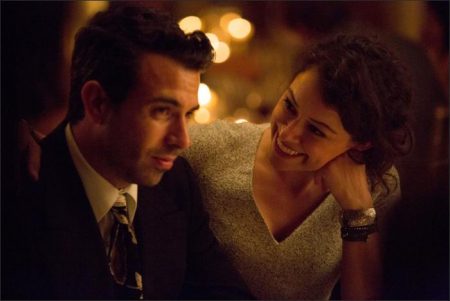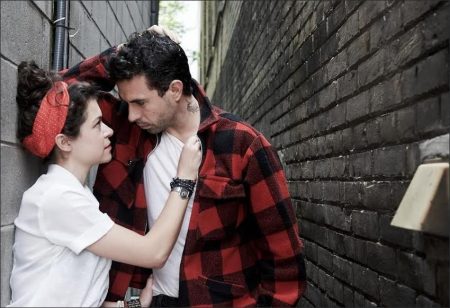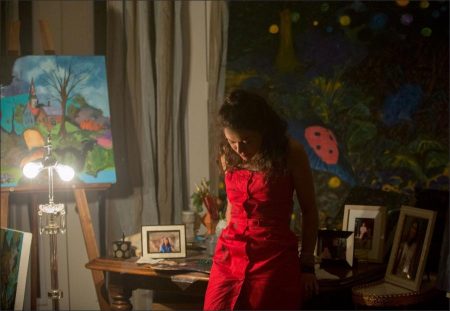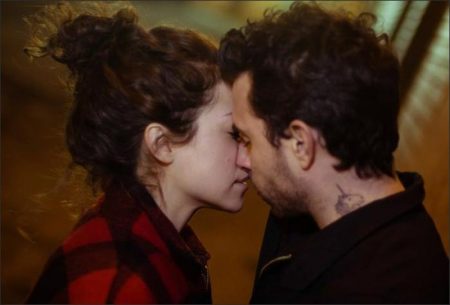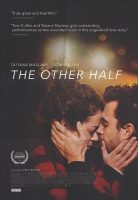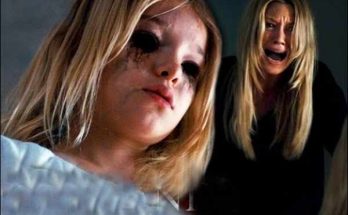The Other Half Movie Storyline. Nickie is a self-destructive loner ever mourning the disappearance of his younger brother. Having abandoned a life of promise in his native UK, he has subsisted by drowning grief in alcohol and violence. On the fifth anniversary of his brother’s disappearance – and on the verge of reaching his nadir – he meets Emily. The two form an immediate, inseparable bond: it is a love at first sight deepened by a shared sense of sorrow.
The Other Side opens with a distraught Nickie focused on his younger brother, who for some unclarified reason went missing five years ago. The next time we see this troubled soul, he is in a dance club moving to throbbing techno music. As he leaves, a man accidentally bumps into him on the sidewalk and he responds by pummeling him. Clearly, Nickie is prone to violently lashing out. Also, he has a cash flow problem, as we spy him talking on a public phone with plastic garbage bags filled with belongings at his feet, assuring his mum back home that he is OK.
Basically, Nickie doesn’t give a hoot about much, including arriving on time for his waiter job at a bar. In fact, he almost immediately gets into a scuffle with a patron—until two young women who have been eyeing him up tell his boss that the other guy started it. Nickie suddenly goes from hothead to sweetheart when he locks eyes with Emily, whose vivacious personality comes courtesy of the immensely engaging Tatiana Maslany of TV cult hit “Orphan Black.” Even though she dubs him “a serious wacko,” they go on a date and romp in the park before he ends up in her bed.
The Other Half is a 2016 Canadian romantic drama film, written and directed by Joey Klein. It stars Tatiana Maslany, Tom Cullen, Henry Czerny, and Suzanne Clément. The film had its world premiere at South by Southwest on March 12, 2016.
Film Review for The Other Half
Tom Cullen and Tatiana Maslany give outstanding performances as two wounded souls in this anguished love story.
A jagged, semi-impressionistic approach and two outstanding lead performances distinguish writer-director Joey Klein’s “The Other Half” among the cinema’s many portraits of self-destructiveness and codependency. What might have seemed pro forma on paper — a man, suffering the effects of long-term grief, forges a deep bond with a young woman with bipolar disorder — overcomes its occasionally studied stylistic tics to become a troubled, anguished love story that neither exaggerates nor soft-pedals the demons on display. The rising profiles of stars Tom Cullen and Tatiana Maslany (both also credited as exec producers) should lend Klein’s accomplished debut feature a halfway decent shot with indie audiences following its SXSW competition premiere.
Five years after the tragic, unexplained disappearance of his younger brother, Nickie Bellow (Cullen), a British man now living abroad (the film was shot in Toronto), is caught in the throes of an intense depression. He barely maintains contact with his parents, who are still in the U.K., and is all too easily provoked into acts of violence, one of which costs him his job as a waiter. The film seeks to immerse us in Nickie’s alienation through a consistent strategy of visual and aural dislocation, favoring back-of-the-head shots and jarring, off-screen sound cues. Klein and d.p. Bobby Shore are especially fond of using rack focus to suggest what their characters are really thinking; a sudden shift to a young boy wandering behind Nickie is surely no accident.
These devices, including a few sequences that use blurry, distorted footage to suggest faded memories, are arresting if mannered. But they recede somewhat, to the movie’s benefit, once Nickie meets a vivacious aspiring painter named Emily (Maslany), toward whom he feels an immediate, and immediately reciprocated, attraction. But if their easy intimacy — afternoons cuddling in the park, private couplings shot with unusual tenderness — initially suggest that Nickie has found his salvation, that illusion is shattered when Emily goes off her meds and her particularly severe form of bipolar disorder resurfaces. The resulting sequence, the film’s most intense and sustained, plays out with her long-suffering father (Henry Czerny) and stepmother (Suzanne Clement) trying to intervene while Nickie watches from afar, helpless and frozen.
Its title more evocative of brokenness and fragmentation than of romantic fulfillment, “The Other Half” traces the fallout from this revelation over the course of about a year. Nickie and Emily spend several months apart so she can recover, but then tentatively renew their bond after she seems to turn a corner. As the two move in together and try to establish a quiet, productive routine, Klein places his emphasis less on the relationship’s volatility than its fragility; he creates the sad impression of a connection that desperately needs to survive, even though it’s entirely likely that it won’t. The resolution, such as it is, sounds a bleakly honest note with the faintest undertone of hope.
Cullen, so memorable as the shy, taciturn half of a gay couple in Andrew Haigh’s superb British indie “Weekend,” brilliantly ratchets up the dramatic tension through body language alone; without overstating it, his performance silently suggests that Nickie sees in his girlfriend some vestige of the lost sibling he couldn’t protect. But Maslany, no stranger to mercurial turns after her endlessly multifaceted work on “Orphan Black,” makes Emily someone far too alive and sprawling to be reduced to a redemptive symbol. In steering its characters through their ups and downs, the film wisely avoids posing any sort of false equivalency between their respective issues, or having them clash in overly on-the-nose fashion.
An actor-producer with a couple of shorts under his directorial belt (including 2012’s “Waiting for You,” which starred Maslany), Klein keeps deepening and developing his film’s dreamlike syntax, echoing the characters’ increasing alienation from the world around them as they withdraw into a private cocoon. Editor James Vandewater sometimes cuts abruptly from one soundscape to another — from the overpowering backbeat of a dance club, say, to the relative quiet of an empty park — while, in addition to some well-chosen soundtrack tunes, Cullen and Klein have written a spare musical score whose electronic repetitions occasionally drown out all other noise. The lingering effect is of an emotional maelstrom that can and will flare up without warning, between long periods of relatively dormancy.
Rather than veering toward melodrama, the film continually focuses on the nervous spectacle of people trying to defuse tense situations — never more awkwardly than at a fancy dinner where Emily, orchestating a formal meeting between Nickie and her parents, proceeds to raise the emotional temperature in a thoroughly unexpected way.
As sympathetic as the two leads are, the film crucially acknowledges the endless patience of the parents in their midst: Czerny is a figure of poker-faced compassion as Emily’s father, while a superb Nancy Palk works wonders in her few scenes as Nickie’s kind-hearted mother. In refusing to shut these loved ones out, as their children often do, Klein’s film provides still another moving perspective on how the other half lives and copes.
The Other Half (2017)
Directed by: Joey Klein
Starring: Tatiana Maslany, Tom Cullen, Henry Czerny, Suzanne Clément, Diana Bentley, Mark Rendall, Allison Brennan, Deragh Campbell, Nancy Palk
Screenplay by: Joey Klein
Production Design by: Chris Crane
Cinematography by: Bobby Shore
Film Editing by: James Vandewater
Costume Design by: Anya Taraboulsy
Set Decoration by: Brian Sidel
Art Direction by: Zosia Mackenzie
Distributed by: Mongrel Media
Release Date: March 10, 2017
Views: 42
